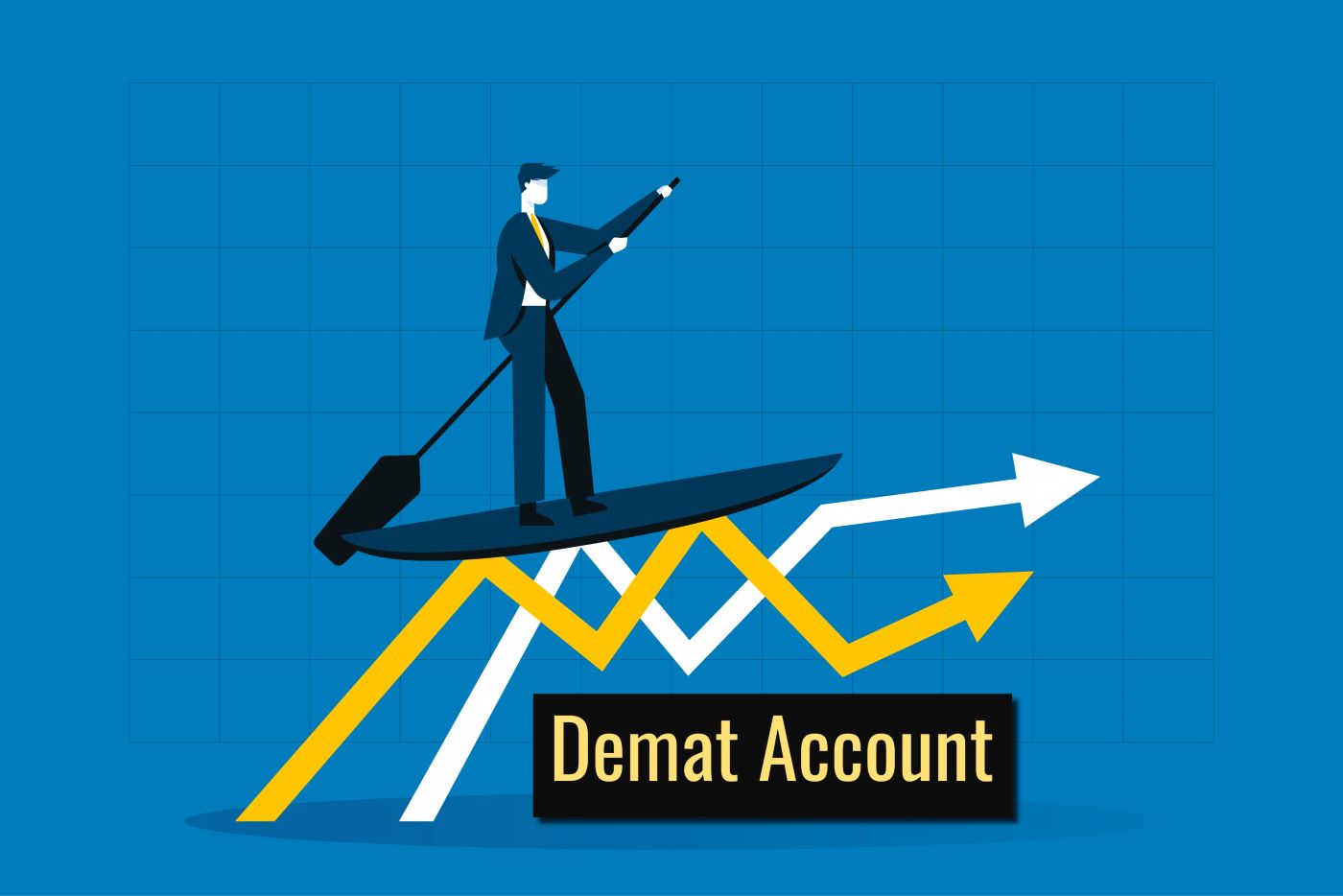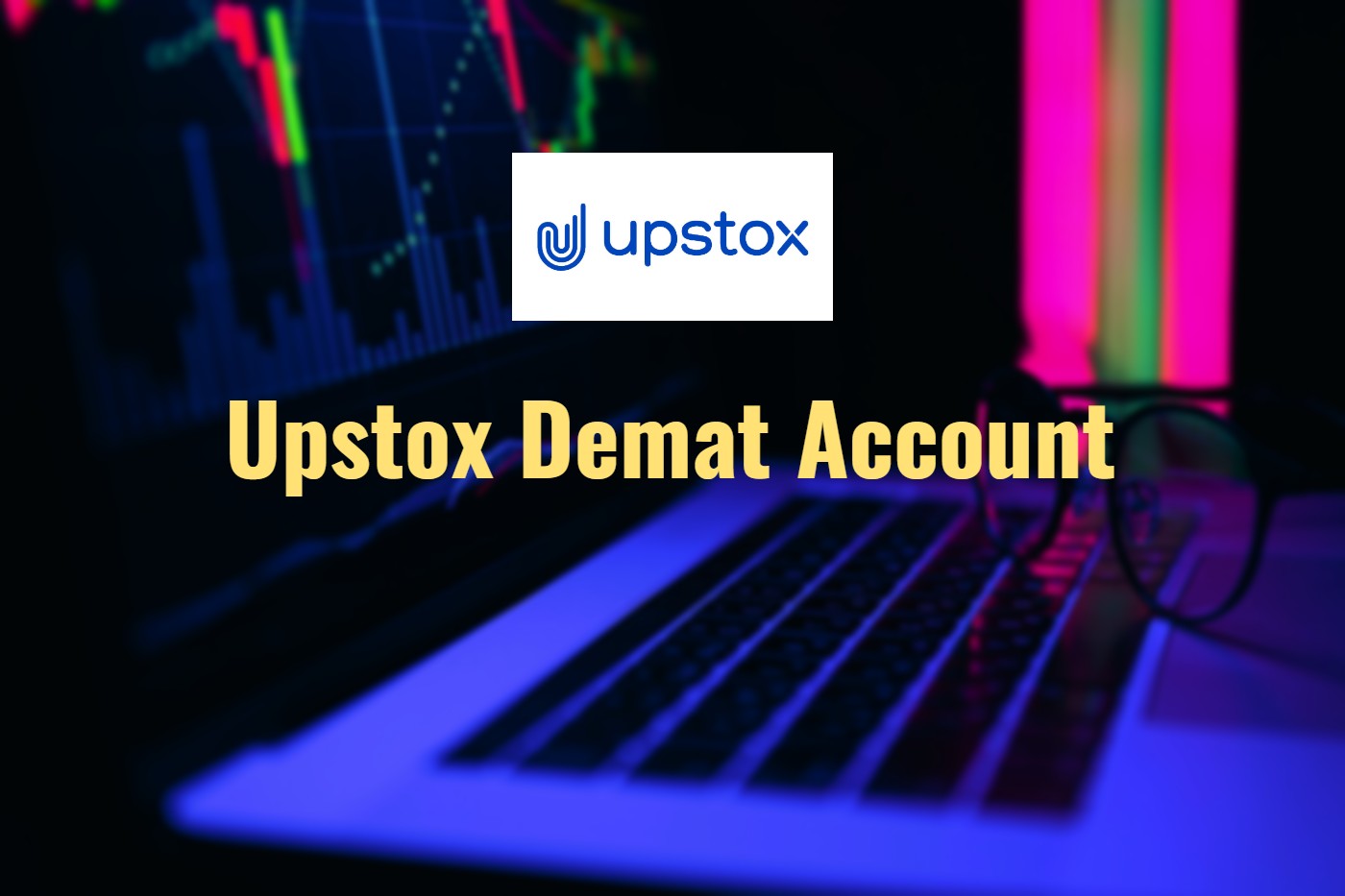Demat
Demat
Published
2 years agoon
By
Ajit Singh
Are you tired of managing stacks of physical share certificates and dealing with the hassle of physical transactions? It’s time to switch to a more modern and convenient way of managing your investments – Demat accounts!
A Demat account, short for “dematerialized account,” is an electronic account that holds your shares and securities in digital form. This means you can easily buy and sell shares online without worrying about physical certificates, and your investments are securely stored in a centralized location.
If you’re interested in opening a Demat account, or you already have one but want to explore more about it, you’ve come to the right place. We are dedicated to providing you with a comprehensive overview of Demat accounts, including how they work, their benefits, and how to choose the best Demat account provider for your needs.
We’ve also included a step-by-step guide on how to open a Demat account, so you can start enjoying the convenience of online investing as soon as possible. Additionally, we’ve compiled a list of frequently asked questions to address any doubts or concerns you may have.
Here, we believe that Demat accounts are the future of investing, and we’re committed to making this process as easy and accessible as possible for everyone. So why not give it a try and see how Demat accounts can help you streamline your investments? Visit our web page today and start your journey towards hassle-free investing!
WHAT IS A DEMAT ACCOUNT?
Demat, short for dematerialization, is the process of converting physical share certificates and securities into electronic form. In India, the Securities and Exchange Board of India (SEBI) introduced the dematerialization process in 1996 to eliminate the need for physical share certificates and make the buying and selling of shares easier and more convenient.
A Demat account is a digital account that holds your shares and securities in electronic form. It is similar to a bank account where you can deposit and withdraw money, but instead of cash, you deposit and withdraw shares and securities.
The benefits of Demat accounts are numerous. For starters, Demat accounts eliminate the need for physical share certificates, which can be easily lost or damaged. With a Demat account, all your shares and securities are stored in a centralized location, making it easy to track your investments and execute transactions from the comfort of your home or office.
Moreover, Demat accounts facilitate faster and more efficient share transfers as they eliminate the need for physical share transfers, which can be time-consuming and involve a lot of paperwork. Transactions can be executed in a matter of seconds, and the shares are credited or debited to your account automatically.
To open a Demat account, you need to approach a registered Depository Participant (DP), who is authorized to open and maintain Demat accounts. The DP will provide you with a Demat account number, which you can use to buy and sell shares online.
To use your Demat account, you also need a trading account with a registered stockbroker. The trading account allows you to place buy or sell orders for shares and securities listed on the stock exchange.
In conclusion, Demat accounts are a convenient and secure way to manage your investments in the digital age. They provide easy access to your investments, eliminate the need for physical share certificates, and make share transfers faster and more efficient. If you’re looking to streamline your investment process, consider opening a Demat account and enjoy hassle-free investing.
HOW TO OPEN A DEMAT ACCOUNT?
PROCESS 01: ONLINE
Are you tired of the hassle of managing physical share certificates and want to embrace the convenience of online investing? Opening an online Demat account in India is easier than you might think. Here, we’ll take you through the steps to open an online Demat account in India and start your journey towards hassle-free investing.
Step 1: Choose a Depository Participant (DP)
A Depository Participant (DP) is a registered intermediary that provides Demat services to investors. There are two depositories in India – NSDL and CDSL – and they have authorized several DPs to offer Demat services. Choose a DP based on their reputation, charges, and customer service.
Step 2: Fill in the Account Opening Form (AOF)
Once you have selected a DP, you need to fill in the Account Opening Form (AOF) provided by them. The AOF requires personal information, such as your name, address, PAN number, and bank details. Fill in the form accurately and attach the required documents, such as identity proof, address proof, and PAN card.
Step 3: Verification of Documents
The DP will verify your documents, and once they are satisfied, they will send you a Client Master Report (CMR) and a Demat account number. The CMR contains your details and the securities held in your Demat account. Verify the details in the CMR and inform the DP of any discrepancies.
Step 4: Trading Account
To start trading in shares, you need a trading account with a registered stockbroker. Your DP may also offer trading services, or you can choose a separate stockbroker. Fill in the trading account opening form and attach the necessary documents. Once the stockbroker verifies your documents, they will provide you with a trading account number.
Step 5: Linking Demat and Trading Accounts
To start trading, you need to link your Demat and trading accounts. Fill in the account linking form provided by the DP or stockbroker, and they will link the accounts for you. Once the accounts are linked, you can start trading in shares and securities listed on the stock exchange.
In conclusion, opening an online Demat account in India is a simple process that can be completed in a few easy steps. Choose a reputable DP, fill in the AOF, verify your documents, open a trading account, and link your Demat and trading accounts. Once your accounts are linked, you can start trading in shares and securities from the comfort of your home. So why wait? Open an online Demat account today and start your journey towards hassle-free investing.
PROCESS 02: OFFLINE
In today’s digital age, online investing has become the norm, but there are still some investors who prefer the traditional method of offline investing. If you’re one of them and looking to open an offline Demat account in India, here is for you. Here’s a step-by-step guide on how to open an offline Demat account in India.
Step 1: Select a Depository Participant (DP)
To open an offline Demat account, you need to select a Depository Participant (DP) who will provide you with the account opening form. DPs are registered intermediaries who offer Demat services to investors. Choose a DP based on their reputation, charges, and customer service.
Step 2: Obtain the Account Opening Form (AOF)
Once you have selected a DP, you need to obtain the Account Opening Form (AOF) from them. The AOF requires personal information such as your name, address, PAN number, and bank details. Fill in the form accurately and attach the required documents, such as identity proof, address proof, and PAN card.
Step 3: Submit the AOF and Documents
Submit the filled-in AOF and documents to the DP’s office. Ensure that you have attached all the required documents and that they are attested by a gazetted officer or notary public.
Step 4: In-Person Verification (IPV)
After submitting the AOF and documents, the DP will conduct an In-Person Verification (IPV). This involves verifying your identity and address in person. You need to visit the DP’s office with your original documents and a copy of the AOF. The DP will verify your documents and take your photograph for their records.
Step 5: Demat Account Number
Once the IPV is complete, the DP will generate a Demat account number for you. The DP will send you a confirmation letter containing your account details and other important information such as charges and fees.
Step 6: Trading Account
To start trading in shares, you need a trading account with a registered stockbroker. Choose a stockbroker and fill in the trading account opening form. Attach the necessary documents and submit them to the stockbroker’s office. Once your documents are verified, the stockbroker will provide you with a trading account number.
Step 7: Linking Demat and Trading Accounts
To start trading, you need to link your Demat and trading accounts. Fill in the account linking form provided by the DP or stockbroker, and they will link the accounts for you. Once the accounts are linked, you can start trading in shares and securities listed on the stock exchange.
In conclusion, opening an offline Demat account in India is a simple process that can be completed in a few easy steps. Choose a reputable DP, fill in the AOF, submit the documents, undergo IPV, obtain a Demat account number, open a trading account, and link your Demat and trading accounts. Once your accounts are linked, you can start trading in shares and securities. So if you prefer the traditional method of investing, open an offline Demat account today and start your journey towards hassle-free investing.
Documents Required to Open a Demat Account
Opening a Demat account is a prerequisite for investing in the Indian stock market. A Demat account holds securities in an electronic format and allows you to buy and sell shares online. To open a Demat account in India, you need to provide certain documents to comply with the regulatory requirements. Here’s a detailed list of documents that you need to submit to open a Demat account in India.
- Identity Proof: You need to provide a valid identity proof document to open a Demat account. Ensure that the ID proof document is not expired and matches the name mentioned in the Demat account application form. This can be any one of the following:
- Aadhaar Card
- PAN Card
- Voter ID Card
- Passport
- Driving License
- Government-issued ID
- Address Proof: To open a Demat account, you also need to provide a valid address proof document. Ensure that the address proof document is not expired and matches the address mentioned in the Demat account application form. This can be any one of the following:
- Aadhaar Card
- Passport
- Voter ID Card
- Driving License
- Bank Statement
- Utility Bill
- PAN Card: A PAN card is mandatory for opening a Demat account in India. It serves as a unique identification number for tax purposes. Ensure that the PAN card is not expired and is linked to your bank account.
- Passport-size Photograph: You need to provide two passport-size photographs along with the Demat account application form. The photographs should be recent and identical.
- Income Proof: Income proof is not mandatory for opening a Demat account. However, it may be required if you wish to trade in derivatives or apply for IPOs. Ensure that the income proof document is recent and matches the income mentioned in the Demat account application form. Income proof documents can be any one of the following:
- Salary Slip
- Income Tax Return (ITR)
- Form 16
- Bank Statement
- Bank Account Details: You need to provide your bank account details to link your bank account with the Demat account. Ensure that the bank account is in your name and is linked to your PAN card. You need to provide the following details:
- Bank Account Number
- Bank Name
- Bank Branch
- IFSC Code
In conclusion, these are the essential documents required to open a Demat account in India. Ensure that you have all the necessary documents in place before you apply for a Demat account. The documents should be valid, accurate, and match the details mentioned in the application form. This will help to speed up the account opening process and ensure a hassle-free experience.
Demat Account Charges
When it comes to selecting a brokerage house (DP) to entrust with your investments, it’s crucial to factor in the Demat Account Charges they levy for rendering their services. But before you take that step, it’s important to verify that the DP is authorized and registered with SEBI, and associated with a reputable depository. As for the account charges, they comprise a collection of various fees, which we’ll delve into below.
Demat Account opening charges
The initial fee you’ll need to shell out when setting up a Demat account is referred to as the account opening charge, which can vary across different brokerage houses, and in some cases, may even be waived altogether.
It’s worth noting that certain brokerage houses offer account opening freebies, so it’s prudent to assess the account types they offer. You could opt for a three-in-one account, which includes a bank account, Demat account, and trading account, or a two-in-one account that doesn’t come bundled with a bank account. Typically, institutions that offer banking services tend to provide three-in-one accounts. In addition to overseeing your account and rendering services as required, both the brokerage house and depository charge an annual fee for account maintenance.
This annual charge, also known as the AMC or Annual Maintenance Charge, is what was referred to earlier. While private brokerage houses usually waive off the annual maintenance charges for trading accounts, the same cannot be said for Demat accounts. Some select private brokerage houses may also choose to exempt you from account maintenance charges, while others offer various deals that can help reduce or waive off AMC fees. As of June 1st, 2019, SEBI has introduced a new service called Basic Services Demat Account (BSDA), which does not require any annual maintenance fees.
However, it’s worth noting that there’s a condition attached to this service. If your account only has debt securities up to Rs. One lakh, there will be no AMC charges. But if it exceeds the Rs. 1 lakh threshold, you’ll need to pay a maximum of Rs. 100 as AMC fees, up until the debt securities in your account reach Rs. Two lakh.
Custodian Charges
Both CDSL and NSDL, the two depositories, levy a custodian fee, which is a one-time charge. Although the DP or brokerage house passes on this charge to the customer and pays it to the depository, it’s rare to come across any brokerage houses that impose this fee.
Brokerage Charges and Transaction Charges
Brokerage charges are determined based on the chosen plan, while transaction charges are levied by the DP on the transactional amount. Since the DP is facilitating your transaction, they charge a fee for the service.
Features of Demat Account
A demat account is an electronic way to hold shares and other securities. It’s a more convenient and efficient way to store and manage your investments than physical certificates. Here are some of the key features of a demat account.
- Safe and Secure: A demat account offers a secure way to store and manage your investments. It eliminates the risk of theft, loss, or damage associated with physical certificates. Your securities are held in electronic form and are protected by high-end security measures.
- Easy to Manage: A demat account makes it easy to manage your investments. You can access your account from anywhere and at any time, and monitor your investments using your computer or mobile phone. It also provides easy tracking of your investments, and you can check the status of your holdings anytime.
- Cost-Effective: A demat account is a cost-effective way to manage your investments. It eliminates the need for stamp duty and other charges associated with physical certificates. You can also save on brokerage fees as demat transactions are generally cheaper than physical ones.
- Quick Transactions: With a demat account, you can buy and sell securities quickly and easily. You can place orders online and get real-time updates on the status of your transactions. It eliminates the need to physically visit a broker or registrar to make transactions.
- Access to IPOs and Mutual Funds: A demat account gives you access to IPOs (Initial Public Offerings) and mutual funds. You can apply for IPOs and buy mutual fund units online, and the shares or units will be credited directly to your demat account.
- Loan Against Securities: With a demat account, you can avail of a loan against your securities. You can pledge your securities and get a loan from the bank or other financial institution. The loan amount is generally a percentage of the market value of your securities.
- Corporate Benefits: When you hold securities in demat form, you are eligible for corporate benefits like dividends, bonus shares, and rights issues. These benefits are credited directly to your demat account.
In conclusion, a demat account offers a wide range of features that make it an excellent choice for managing your investments. It provides a secure and efficient way to store and manage your securities, and offers several benefits like cost-effectiveness, quick transactions, and access to IPOs and mutual funds. If you’re looking to invest in shares and other securities, a demat account is a must-have.
Benefits of Demat Account
Dematerialized accounts, or Demat accounts, are essential for any investor who wants to participate in the stock market. A Demat account is a digital account that stores shares, bonds, mutual funds, and other securities in electronic form. In India, the Securities and Exchange Board of India (SEBI) regulates the Demat accounts, and the National Securities Depository Limited (NSDL) and the Central Depository Services (India) Limited (CDSL) offer the Demat account services. The benefits of having a Demat account are numerous, and in here, we will discuss them in detail.
Safe and secure storage of securities: Demat accounts eliminate the need for physical securities, such as share certificates, which can be easily lost, stolen, or damaged. The securities held in Demat accounts are stored in electronic form, and the chances of them getting misplaced or damaged are minimal. Moreover, Demat accounts are protected by high-end security measures such as two-factor authentication, password-protected login, and transaction-specific security measures.
- Easy and efficient trading: The Demat account makes trading easy and efficient. Buying and selling securities online is simple and can be done from the comfort of your home or office. You don’t have to go through the hassle of visiting a broker’s office or filling out paperwork. Moreover, the settlement of transactions is faster as the securities are held in electronic form, and the process is automated.
- Reduced paperwork and costs: With Demat accounts, there is no need for physical securities or paperwork, and this leads to a significant reduction in costs associated with handling and maintaining physical securities. The Demat account also eliminates the need for stamp duty payments that are required for physical securities. This makes Demat accounts a cost-effective option for investors.
- Easy access to information: Demat accounts offer investors easy access to information such as the status of their holdings, transaction history, and other related information. This helps investors keep track of their investments and make informed decisions about buying or selling securities.
- Transferring securities becomes easy: Demat accounts make it easy to transfer securities from one account to another. The transfer process is simple and can be done online without any paperwork. This feature is especially helpful for investors who want to transfer their securities to their family members or another account.
- Loan against securities: Demat accounts also provide investors with the option of availing loans against their securities. Banks and financial institutions offer loans against securities held in Demat accounts at a lower interest rate than regular loans.
In conclusion, Demat accounts offer numerous benefits to investors. They provide a safe and secure way to hold securities, reduce paperwork and costs, offer easy access to information, and make trading and transferring securities easy and efficient. Moreover, the option of availing loans against securities held in Demat accounts makes it a popular choice for investors. Therefore, if you are an investor, opening a Demat account is a wise decision that will help you simplify and streamline your investment process.
What is a Free Demat Account?
In India, a Demat Account is a digital account that holds securities like stocks, bonds, mutual funds, and other investment products in electronic form. It makes the process of buying and selling these securities much simpler and hassle-free. Typically, there are charges involved with opening and maintaining a Demat Account, including account opening fees, annual maintenance charges, and transaction fees.
However, there is an alternative option available known as a Free Demat Account. As the name suggests, it is a Demat Account that comes with zero or minimal charges. These accounts are usually offered by discount brokers or online trading platforms, and they are becoming increasingly popular among investors.
So, what exactly is a Free Demat Account, and what are its benefits?
A Free Demat Account is a type of Demat Account that does not charge an account opening fee or annual maintenance charges. These accounts are generally offered by discount brokers who operate online and do not have the overheads of a traditional full-service brokerage firm. As a result, they can offer their services at a lower cost to investors.
The benefits of a Free Demat Account are numerous:
- No Account Opening Fees: With a Free Demat Account, you don’t have to pay any account opening fees. This means that you can start investing in the stock market without any initial investment.
- No Annual Maintenance Charges: Unlike traditional Demat Accounts, Free Demat Accounts don’t charge annual maintenance fees. This means that you don’t have to pay any fees for maintaining your account. This makes it a cost-effective option for investors who are just starting out.
- Lower Transaction Fees: Free Demat Accounts usually charge lower transaction fees than traditional Demat Accounts. This can help you save money on your investment transactions.
- Online Access: Free Demat Accounts are generally operated online, which means that you can access your account from anywhere at any time. This makes it more convenient for investors who are always on the go.
- Easy Account Opening Process: The account opening process for a Free Demat Account is usually quick and easy. You can open an account online within minutes, and you don’t have to submit a lot of paperwork.
- Additional Benefits: Some Free Demat Accounts also offer additional benefits like research reports, market insights, and trading tools to help investors make informed investment decisions.
In conclusion, a Free Demat Account is a cost-effective and convenient option for investors who are just starting out or looking to save on their investment costs. With no account opening fees, no annual maintenance charges, and lower transaction fees, it can help you save money while investing in the stock market. However, it is important to do your research and choose a reliable and trustworthy broker to open your Free Demat Account with.
Things to check before Opening a Demat Account
Investing in the stock market can be a great way to grow your wealth over time. However, before you can start investing, you’ll need to open a Demat account. A Demat account is a digital account that allows you to hold and trade stocks, bonds, and other securities electronically. But before you open a Demat account, here are a few things you should check.
- Authorized Depository Participant: The first thing you should check before opening a Demat account is whether the brokerage firm you’re considering is an authorized Depository Participant (DP) with either National Securities Depository Limited (NSDL) or Central Depository Services Limited (CDSL). Authorized DPs have the permission to offer Demat services.
- Brokerage charges: Brokerage charges are the fees that a broker charges you for facilitating your trades. These charges can vary widely from one broker to another, so it’s important to shop around and compare brokerage charges before opening a Demat account. Some brokers may offer lower charges if you trade frequently or hold a certain balance in your account.
- Account opening charges: Some brokers charge an account opening fee to new customers. However, many brokers waive this fee or offer it for free, especially for online accounts.
- AMC charges: Annual Maintenance Charges (AMC) is a yearly fee charged by the DP for maintaining your Demat account. This fee can vary from one DP to another, so it’s important to check the AMC charges before opening an account. Some DP’s waive off AMC charges for a certain period or if you maintain a minimum balance in your account.
- Additional charges: Apart from the account opening fee and AMC, there are other charges that you should be aware of, such as transaction charges, custodian fees, and account closure charges. Make sure to ask the broker about any additional charges and read the fine print of the agreement.
- Customer service: Before opening a Demat account, it’s important to check the customer service offered by the broker. A good broker should offer prompt and efficient customer service to help you with any issues or queries related to your Demat account.
- Online platform: Check whether the broker provides an online platform to trade, view your account statements, and manage your account. An online platform makes it easier to access your account and make transactions at your convenience.
In conclusion, before opening a Demat account, it’s essential to check the authorized Depository Participant, brokerage charges, account opening charges, AMC charges, additional charges, customer service, and online platform. Doing your due diligence before opening a Demat account will ensure that you choose a broker that meets your requirements and provides you with the best possible service.
How to choose the Best Demat account?
In today’s world, investing in the stock market has become one of the most popular ways to grow your wealth. However, before investing, you need to have a Demat account. A Demat account is an essential requirement for trading in the stock market. It is a digital repository of all your shares, bonds, and other securities. With the help of a Demat account, you can buy and sell securities online. There are many Demat account providers available in the market, and choosing the right one can be quite challenging. In here, we will discuss some tips on how to choose the best Demat account.
- Research and compare: The first and foremost thing to do is research the available Demat account providers and compare them. Check their reputation, experience, fees, and services offered.
- Brokerage charges: Brokerage charges are the most crucial factor while choosing a Demat account. Choose a Demat account provider who offers the lowest brokerage charges without compromising on the quality of services.
- Transaction fees: Transaction fees are also a vital factor to consider. Check the transaction fees charged by the Demat account provider. Make sure that the transaction fees are reasonable and affordable.
- Account opening charges: Many Demat account providers charge a fee for opening an account. Look for a Demat account provider who offers a free account opening facility.
- Technology and user interface: Choose a Demat account provider who has a user-friendly website and mobile application. The website and application should be easy to navigate, and the interface should be intuitive.
- Customer support: Good customer support is essential while dealing with a Demat account provider. Look for a Demat account provider who offers 24/7 customer support through various channels like phone, email, and chat.
- Additional services: Look for a Demat account provider who offers additional services like research reports, trading tips, and investment advice. These services can help you make informed investment decisions.
- Security: Security is the most important factor to consider while choosing a Demat account provider. Look for a provider who offers multi-layered security features like two-factor authentication, encryption, and biometric authentication.
In conclusion, choosing the best Demat account is essential for successful trading in the stock market. By considering the above factors, you can choose a Demat account provider who offers reliable and efficient services at reasonable prices. Make sure to read the terms and conditions carefully before choosing a Demat account provider.
How to use a Demat Account?
In today’s world, investing in the stock market has become one of the most popular ways to grow your wealth. However, before investing, you need to have a Demat account. A Demat account is an essential requirement for trading in the stock market. It is a digital repository of all your shares, bonds, and other securities. With the help of a Demat account, you can buy and sell securities online. There are many Demat account providers available in the market, and choosing the right one can be quite challenging. In here, we will discuss some tips on how to choose the best Demat account.
- Research and compare: The first and foremost thing to do is research the available Demat account providers and compare them. Check their reputation, experience, fees, and services offered.
- Brokerage charges: Brokerage charges are the most crucial factor while choosing a Demat account. Choose a Demat account provider who offers the lowest brokerage charges without compromising on the quality of services.
- Transaction fees: Transaction fees are also a vital factor to consider. Check the transaction fees charged by the Demat account provider. Make sure that the transaction fees are reasonable and affordable.
- Account opening charges: Many Demat account providers charge a fee for opening an account. Look for a Demat account provider who offers a free account opening facility.
- Technology and user interface: Choose a Demat account provider who has a user-friendly website and mobile application. The website and application should be easy to navigate, and the interface should be intuitive.
- Customer support: Good customer support is essential while dealing with a Demat account provider. Look for a Demat account provider who offers 24/7 customer support through various channels like phone, email, and chat.
- Additional services: Look for a Demat account provider who offers additional services like research reports, trading tips, and investment advice. These services can help you make informed investment decisions.
- Security: Security is the most important factor to consider while choosing a Demat account provider. Look for a provider who offers multi-layered security features like two-factor authentication, encryption, and biometric authentication.
In conclusion, choosing the best Demat account is essential for successful trading in the stock market. By considering the above factors, you can choose a Demat account provider who offers reliable and efficient services at reasonable prices. Make sure to read the terms and conditions carefully before choosing a Demat account provider.
Demat Account Processes
A Demat account, also known as a Dematerialized account, is a type of account that allows you to hold your securities in an electronic form instead of physical certificates. It is an essential tool for investors who wish to trade or invest in securities such as stocks, mutual funds, bonds, and government securities. In here, we will discuss the Demat account processes that you need to know to manage your investments effectively.
Step 1: Open a Demat account
The first step in using a Demat account is to open one. You can do this by visiting a Depository Participant (DP) such as a bank, brokerage firm, or financial institution, and submitting the required documents such as identity proof, address proof, PAN card, and bank details. Once your account is opened, you will be provided with a unique Demat account number (DP ID) that you can use to access your account.
Step 2: Link your bank account
To trade or invest in securities using your Demat account, you need to link it with your bank account. This allows you to transfer funds from your bank account to your Demat account and vice versa. You can do this by providing your bank account details to your DP and completing the necessary formalities.
Step 3: Buy or sell securities
Once your Demat account is linked to your bank account, you can start buying or selling securities. To buy securities, you need to place an order with your broker or DP, specifying the security you want to buy and the price you are willing to pay. Similarly, to sell securities, you need to place an order with your broker or DP, specifying the security you want to sell and the price you are willing to accept.
Step 4: Settlement of trades
When you buy or sell securities using your Demat account, the trades are settled in T+2 days. This means that the securities or funds are transferred from your account on the second working day after the transaction is executed. For example, if you buy securities on Monday, the settlement will take place on Wednesday.
Step 5: Monitor your portfolio
Using a Demat account, you can monitor your portfolio and keep track of your investments. You can check your account balance, transaction history, and portfolio performance online. This allows you to make informed investment decisions and take timely action to optimize your portfolio.
In conclusion, a Demat account is a simple and convenient way to hold your securities in electronic form. By following these Demat account processes, you can effectively manage your investments and achieve your financial goals.
Demat Account Concepts
Dematerialization is the process of converting physical securities into electronic form, making it convenient for investors to trade and manage their securities. This is where depositories come in, providing a platform for investors to hold their securities electronically. In India, there are two depositories, National Securities Depository Limited (NSDL) and Central Depository Services Limited (CDSL).
Once you have opened a Demat account with a depository participant (DP), you can start the dematerialization procedure. This involves submitting your physical certificates to your DP along with a dematerialization request form. The DP then forwards the request to the concerned company or registrar and transfer agent (RTA), who will verify the documents and initiate the dematerialization process.
Once your physical certificates have been dematerialized, the depository will credit your Demat account with the equivalent number of electronic securities. This process is known as Dematerialization Credit. You can then easily transfer or sell these electronic securities.
In case of transmission or transposition of securities, the Demat account holder needs to follow the Transmission cum Demat or Transposition cum Demat process. In case of the death of the account holder, the legal heirs need to submit the required documents to the DP for transmission of securities to their Demat account. In the case of transposition of securities, the account holder can request the DP to change the order of names in the securities account.
If an investor wishes to convert their electronic securities back into physical form, they can opt for the rematerialization process. This involves submitting a rematerialization request form to the DP, who then forwards the request to the depository. The depository will then inform the concerned RTA to issue physical certificates.
There may be instances where an investor wants to temporarily restrict access to their Demat account, such as in cases of a dispute or fraud. In such cases, the investor can request their DP to freeze their Demat account. This prevents any transactions or transfers from taking place in the account. However, once the dispute or fraud is resolved, the investor can request for de-freezing of their account.
Lastly, if an investor wishes to close their Demat account, they can submit a request for closure to their DP. However, it is important to note that the investor must first clear all outstanding dues and ensure that there are no securities remaining in the account. Once the account is closed, the DP will provide a closure statement for the account holder’s records.
In conclusion, a Demat account is a convenient way for investors to hold their securities electronically. Understanding the basic concepts of depository, dematerialization, and related procedures such as transmission, transposition, rematerialization, freezing, de-freezing, and closure are essential for efficient management of a Demat account.
Various Types of Demat Account
A Demat account is an essential requirement for trading and investing in the Indian stock market. It is an account that holds securities in an electronic format, eliminating the need for physical share certificates. There are different types of Demat accounts available in India, each designed to cater to specific requirements of the investor. In here, we will take a closer look at the different types of Demat accounts and their features.
- Regular Demat Account: A regular Demat account is a standard type of account that holds securities in an electronic format. This account is suitable for investors who are looking to buy and hold stocks for a longer duration. The account can be opened with any registered Depository Participant (DP) of NSDL or CDSL. The account opening charges and annual maintenance charges apply to this type of account.
- Basic Services Demat Account (BSDA): The Basic Services Demat Account is a type of account that has been introduced by SEBI for small investors. The account is designed to provide cost-effective services to those who hold a limited number of securities. If the value of the securities in the account is less than Rs. 2 lakhs, there are no annual maintenance charges for the first year. For securities between Rs. 2 lakhs and Rs. 5 lakhs, the charges are capped at Rs. 100 per year.
- Repatriable Demat Account: A Repatriable Demat Account is suitable for Non-Resident Indians (NRIs) who wish to invest in the Indian stock market. The account allows for the transfer of funds from foreign banks to the Demat account and vice versa. The account is linked to an NRE bank account, and the investments made through this account can be repatriated abroad.
- Non-Repatriable Demat Account: A Non-Repatriable Demat Account is similar to a Repatriable Demat Account, but the funds invested in this account cannot be repatriated abroad. This account is suitable for NRIs who have funds in India that they do not wish to repatriate.
- Joint Demat Account: A Joint Demat Account is suitable for individuals who wish to hold securities jointly with another person. This account can be opened with a maximum of three account holders, and the securities held in the account are equally divided among them.
- Corporate Demat Account: A Corporate Demat Account is suitable for companies and institutions that wish to hold securities in an electronic format. The account can be opened in the name of the company, and the authorized signatories of the company can operate the account.
Choosing the right type of Demat account is crucial for investors. The type of account chosen should be based on the investor’s requirements and the amount of securities they hold. It is important to evaluate the charges and services provided by different DP’s before opening a Demat account. A Demat account offers several advantages to investors, including lower transaction costs, faster settlement times, and reduced risk of loss or damage to physical share certificates.
How to find your Demat Account Number?
To find your Demat account number, you can follow the below steps:
- Log in to your Demat account: The first step is to log in to your Demat account. You can do this by visiting the website of the Depository Participant (DP) where you have opened your Demat account.
- Locate your account details: Once you are logged in, you can locate your account details section. This section will contain information about your Demat account such as your name, address, contact details, and your Demat account number.
- Check your account statement: If you are unable to find your Demat account number in the account details section, you can check your account statement. Your Demat account number will be mentioned in the account statement.
- Contact your DP: In case you are still unable to find your Demat account number, you can contact your DP. They will be able to provide you with your Demat account number after verifying your identity.
It is important to keep your Demat account number safe and secure as it is a unique identifier for your Demat account. You will need your Demat account number to carry out various transactions such as buying or selling securities, transferring securities, and more.
How to Transfer Shares from One Demat Account to Another?
Online Demat Account Transfer
Investing in the stock market can be an exciting and profitable venture, but it’s important to ensure that your investments are safe and secure. One way to do this is to open a demat account, which is an electronic account that holds your securities in a digital format.
Once you have a demat account, it’s possible to transfer shares from one account to another online. This can be a convenient way to move your securities around without having to physically visit a broker or exchange. Here’s how to transfer shares from one demat account to another online:
Step 1: Check eligibility
Before you begin, ensure that both your demat accounts are active and eligible for share transfer. Also, confirm that the shares you wish to transfer are eligible for electronic transfer.
Step 2: Initiate the transfer
To initiate the transfer, log in to your demat account with the account holder ID and password. Then, go to the ‘Transfer of Shares’ or ‘Delivery Instruction Slip’ (DIS) section of the account. Select the option for transferring shares from one account to another and fill out the necessary details like the target demat account number, type and quantity of shares to be transferred, and any other relevant details.
Step 3: Generate DIS
After filling out the details, generate a Delivery Instruction Slip (DIS) by clicking on the ‘generate DIS’ button. This slip acts as an instruction to transfer the shares from one demat account to another.
Step 4: Sign the DIS
Once you have generated the DIS, take a printout of the slip and sign it. Ensure that you sign the DIS exactly as it appears in your account records.
Step 5: Submit the DIS
After signing the DIS, submit it to your Depository Participant (DP) either physically or through an online portal. Ensure that you submit the DIS within the designated timeframe to avoid any delays or penalties.
Step 6: Receive confirmation
After submitting the DIS, wait for confirmation from your DP. Once the transfer is complete, you will receive a confirmation message or email from your DP. You can also check the status of the transfer online through your demat account.
It’s important to note that transferring shares from one demat account to another online requires careful attention to detail to ensure that the transfer is successful. Double-check all the details before submitting the DIS, and make sure that you have signed the slip correctly. With these precautions in place, you can easily transfer your shares from one demat account to another online.
Manual Transfer of Shares
In today’s digital era, most of the processes related to finance and investments are conducted online. However, there may be instances where manual transfer of shares from one demat account to another may be required. In here, we will discuss the steps involved in manually transferring shares from one demat account to another.
Before we delve into the steps, let us first understand the process of share transfer in a demat account. The transfer of shares from one demat account to another involves two major steps – a) Dematerialization and b) Rematerialization.
Dematerialization is the process of converting physical share certificates into electronic form, which are then stored in a demat account. Rematerialization, on the other hand, is the process of converting electronic shares back into physical form.
Now, let’s move on to the steps involved in manually transferring shares from one demat account to another:
Step 1: Obtain a Delivery Instruction Slip (DIS) from the target demat account holder
The DIS is a physical slip that needs to be filled out to transfer shares from one demat account to another. The DIS should be duly filled and signed by the account holder of the target demat account.
Step 2: Submit the DIS form
After filling up the DIS form, you need to submit it to your DP or broker. You can either do it physically by visiting their office or send it through a registered post. Make sure you keep a copy of the DIS form and take a receipt after submitting it.
Step 3: Verification of DIS form
After receiving the DIS form, the DP or broker will verify the details mentioned in the form. If the details are correct, they will execute the transfer of shares.
Step 4: Confirmation of transfer
After the transfer of shares is executed, the DP or broker will send a confirmation of transfer to both the sender and receiver of the shares.
Step 5: Updating of demat accounts
After the confirmation of transfer is received, the DP or broker will update the demat accounts of the sender and receiver with the transferred shares.
It is important to note that there may be charges associated with the manual transfer of shares from one demat account to another. These charges may vary from one DP or broker to another, and it is advisable to check with them before initiating the transfer.
In conclusion, transferring shares from one demat account to another manually is a simple process, but it requires filling up and submitting the DIS form and verifying the details. With the proper steps and precautions, one can easily transfer their shares from one demat account to another manually.
How to link your Aadhaar Number with Demat Account?
Linking your Aadhaar number with your Demat account is an important step towards complying with regulatory requirements and ensuring the security of your investments. Here’s a step-by-step guide on how to link your Aadhaar number with your Demat account:
- Visit the website of your Demat account provider or the depository participant (DP) with whom you hold the account.
- Log in to your account using your user ID and password.
- Look for the option to link your Aadhaar number with your Demat account. This can usually be found under the ‘Profile’ or ‘Settings’ section of your account.
- Enter your Aadhaar number and other details such as your name, date of birth, and gender as mentioned in your Aadhaar card.
- Verify your details and submit the form.
- You will receive an OTP (one-time password) on your registered mobile number linked with your Aadhaar. Enter the OTP on the website to complete the verification process.
- Once the verification is done, your Aadhaar number will be linked with your Demat account.
It is important to note that linking your Aadhaar number with your Demat account is a mandatory requirement as per SEBI guidelines. Non-compliance with this requirement may result in your account being frozen or deactivated. Therefore, it is advisable to link your Aadhaar number with your Demat account as soon as possible.
How to convert physical shares to Demat?
In India, before the advent of the Demat system, shares were held in physical form, which meant that share certificates were issued to investors as proof of ownership. However, with the introduction of the Demat system, the need for physical share certificates has become obsolete. Holding shares in a Demat account is not only more convenient but also safer as it eliminates the risks associated with physical certificates, such as loss or damage.
If you are still holding physical share certificates and want to convert them into Demat form, you can follow the below-mentioned steps:
Step 1: Open a Demat Account
The first step in converting physical shares to Demat form is to open a Demat account with a Depository Participant (DP) of your choice. The DP will provide you with a Demat account number and other necessary details. You can open a Demat account with any of the two depositories in India, i.e., NSDL or CDSL.
Step 2: Fill up Dematerialisation Request Form (DRF)
After opening a Demat account, you need to fill up a Dematerialisation Request Form (DRF). You can obtain the DRF from your DP or download it from the website of NSDL or CDSL. The DRF requires you to provide details such as the name of the company whose shares you want to dematerialize, the number of shares, and the distinctive numbers of the shares.
Step 3: Submit DRF and Physical Share Certificates to DP
Once you have filled up the DRF, you need to submit it along with the physical share certificates to your DP. It is important to note that the share certificates must be in your name, and the signature on the DRF must match the signature on the share certificates.
Step 4: DP Verifies and Sends DRF to Registrar and Transfer Agent (RTA)
Upon receiving the DRF and physical share certificates, the DP will verify the details provided by you and then send the DRF to the Registrar and Transfer Agent (RTA) of the company whose shares you want to dematerialize. The RTA will then verify the details and confirm the dematerialization.
Step 5: Shares get credited to your Demat account
Once the dematerialization is confirmed, the shares will be credited to your Demat account. You can check the status of the dematerialization request on the website of NSDL or CDSL.
It is important to note that the process of converting physical shares to Demat form can take up to 15-30 days, depending on the efficiency of the RTA and DP. Also, there may be a nominal fee charged by the DP for dematerialization, which may vary from one DP to another.
In conclusion, converting physical shares to Demat form is a straightforward process that can be done by following the above-mentioned steps. By holding shares in Demat form, you not only ensure their safety and convenience but also make it easier to track and trade them in the future.
What is a Minor Demat Account?
A minor demat account is a type of demat account that is opened on behalf of a minor by a guardian or parent. A minor is a person who has not yet attained the age of 18 years. The minor demat account helps in the safekeeping of securities in electronic form, just like any other demat account. The guardian or parent of the minor operates the account until the minor becomes a major.
The minor demat account has several benefits. Firstly, it helps in the safekeeping of securities in electronic form. It also eliminates the risks associated with physical securities, such as theft, loss, or damage. Secondly, it helps minors to learn about the stock market and investing in securities at an early age. By opening a minor demat account, parents or guardians can teach their children about investments and financial planning.
To open a minor demat account, a guardian or parent needs to submit the minor’s birth certificate, identity proof, and address proof along with their own documents. The account can be opened with any depository participant (DP) registered with the Securities and Exchange Board of India (SEBI).
Once the minor turns 18 years old, the account needs to be converted into a regular demat account, and the minor needs to submit their KYC documents and sign the necessary paperwork. Alternatively, the account can also be closed if the minor is not interested in continuing the account.
In conclusion, a minor demat account is a great way to start educating children about investing and financial planning. It provides a safe and secure platform to invest in securities and helps inculcate good financial habits from an early age.
What is a Joint Demat Account?
A joint demat account is a type of demat account that is held by two or more individuals as joint account holders. It allows the account holders to jointly hold and manage their securities investments, such as stocks, bonds, mutual funds, and other financial instruments in electronic form.
A joint demat account can be opened by spouses, family members, or business partners who wish to pool their resources and invest jointly in the securities market. It is a convenient way to manage and keep track of their investments, as all account holders have equal rights and access to the account.
In a joint demat account, each account holder is required to provide their personal and financial details, including their PAN card, bank account details, and other KYC documents. The account can be operated jointly, where all account holders need to provide their signatures or authorization for any transaction. Alternatively, it can also be operated either by any one of the account holders or through either or survivor mode.
It is essential to choose the right account holder combination while opening a joint demat account, as it will affect the ownership and management of the account. In the case of the demise of one of the account holders, the account can be transferred to the surviving account holder(s) or as per the nomination made by the account holders.
A joint demat account offers several benefits, including convenience in managing investments, sharing of investment risks and rewards, and better decision-making with the involvement of multiple account holders. However, it is crucial to maintain transparency, trust, and clear communication among the account holders to avoid any conflicts or misunderstandings in the future.
How Demat Account Works?
Dematerialization or Demat is the process of converting physical securities into electronic form. In India, Demat accounts are maintained by two depositories, National Securities Depository Limited (NSDL) and Central Depository Services Limited (CDSL). A Demat account is mandatory for trading in the stock market.
So, how does a Demat account work? Let’s take a closer look at the process.
Opening a Demat Account:
The first step is to open a Demat account with a depository participant (DP). A DP is an intermediary between the investor and the depository. The investor needs to submit the necessary documents like PAN card, Aadhaar card, address proof, and bank details to the DP. Once the documents are verified, the DP will open a Demat account for the investor.
Depositing Securities:
After opening the Demat account, the investor can deposit the physical securities to the DP for dematerialization. The investor needs to fill a dematerialization request form (DRF) and submit it to the DP along with the physical certificates. The DP will send the DRF and the physical certificates to the registrar and transfer agent (RTA) of the company.
Verification:
The RTA will verify the details mentioned in the DRF with their records. Once the verification is complete, the physical certificates will be destroyed, and the equivalent number of electronic shares will be credited to the investor’s Demat account.
Trading:
Once the shares are credited to the Demat account, the investor can start trading in the stock market. The investor needs to place an order with the broker, who will then execute the order on the stock exchange. The shares will be debited from the investor’s Demat account and credited to the buyer’s account.
Benefits of Demat Account:
The Demat account offers several benefits like safety, convenience, and transparency. Holding securities in electronic form eliminates the risk of loss or theft of physical certificates. The investor can also access their Demat account online, which makes it convenient to track the securities and carry out transactions. Demat accounts also offer transparency as the investor can see the details of all their holdings and transactions in one place.
Conclusion:
Demat accounts have made investing in the stock market easier and safer for investors. The process of converting physical securities into electronic form and trading in the stock market has become simpler and more efficient. Investors should choose a reputable DP and take necessary precautions to safeguard their Demat account.
Open Demat Account FAQs
Why is Demat account required to trade in stock market?
In essence, a demat account functions as a storage facility for all your shares, similar to a bank account. Thus, to engage in trading of shares, it is imperative to open a demat account. It enables traders to buy and sell shares seamlessly, without any physical transfer of the shares, at any time of the day.
How long does it take to open Demat account?
The time taken to open a demat account can vary based on the method you choose, i.e., online or offline. If you opt for online account opening, the process is usually completed within a maximum of 72 hours.
Which are the best brokers for opening Demat accounts?
Some of the leading brokers in the market for opening a demat account include Angel Broking, Kotak Securities, Motilal Oswal, Reliance, and many more.
Where can I open instant Demat account and start trading the same day?
We have provided you with a list of companies in the market that allow you to open an instant demat account and help you to start reading the very same day. Some of them are, Zerodha, 5Paisa, Angel broking et cetera.
What is Demat account AMC?
The demat account AMC or account maintenance charge is the amount that you need to maintain your demat account. It is only applicable to the fact that most of the stock brokers charge demat AMC once every year whatsoever. Some even waive it off too.
Where can I find demat account charges for different brokers?
In this very article on our website, we have provided you with the different account charges for different brokers in the market.
Where can I open free Demat account?
You can open free demat accounts in a lot of brokerage houses. Some of them are: Upstox, Motilal Oswal, Zerodha, Angel broking, so on and so forth.
What should I check before opening Demat account?
The first thing has to be the type of broker you are dealing with because it is the main factor which will allow you to carry out your transactions. Then comes the brokerage charges that also play a significant role. Following this is the online access of it, customer support and a bountiful nomination.

Upstox Demat Account – Find Opening Process, Charges & more
The Upstox Demat Account offers traders the opportunity to trade at incredibly low prices across all market segments. With a focus on technology, Upstox is a discount brokerage house that provides a user-friendly platform, making trading simple and profitable for its users. This article will delve into the various aspects of the Upstox Demat Account, including its charges, features, and services.
The Upstox Trading Account allows traders to trade across multiple asset segments, such as equities, commodities, currencies, and more. This diverse range of options provides traders with the flexibility to invest in various instruments based on their investment preferences and risk appetite.
As a tech-first brokerage house, Upstox is committed to offering innovative services and products to its clients. Its user-friendly interface and advanced trading tools empower traders to make well-informed decisions and execute trades efficiently. This tech-driven approach sets Upstox apart from traditional brokerage houses, attracting traders looking for seamless and cost-effective trading solutions.
Now, let’s explore the details of the Upstox Demat Account. The account opening charges and annual maintenance fees associated with the Upstox Demat Account are designed to be competitive and affordable. By keeping the account opening charges at an attractive level, Upstox aims to encourage more traders to avail of its services and participate in the financial markets.
Moreover, the article will cover a wide range of features and services provided by Upstox, enhancing the trading experience for its clients. From a wide array of investment options to innovative research tools and trading platforms, Upstox equips its traders with the necessary resources to make informed investment decisions.
In conclusion, the Upstox Demat Account is an ideal choice for traders seeking cost-effective and user-friendly trading solutions. With its commitment to technology-driven services and unbeatable low prices, Upstox empowers traders to trade across various market segments and capitalize on investment opportunities. Whether you are a seasoned investor or a novice trader, the Upstox Demat Account provides the tools and features to make your trading journey simple, profitable, and rewarding.
Upstox was established in 2009 as an online investment platform, catering to the specific requirements of its customers through its user-friendly online trading platform. Operating under the brand name of RKSV Securities, Upstox aims to empower investors by providing them with easy access to a seamless trading experience.
Being a technology-driven stock brokerage house, Upstox offers exceptionally advanced trading terminals across various platforms. Traders using the Upstox Demat Account can conduct a wide range of analyses as the trading platforms are equipped with abundant charting tools.
Backed by a distinguished group of traders and investors, including Ratan Tata and Kalaari Capital, Upstox has earned a reputation as one of the most reliable discount brokerage houses in India. It provides different trading solutions at unprecedented rates, making it a top choice among traders and investors.
Upstox Demat Account Features
When you trade with the Upstox Demat Account, you gain access to a plethora of features that enhance your trading experience:
- Two Kinds of Accounts: Upstox offers two account types – the Basic Plan and the Upstox Priority Pack. The Basic Plan allows trading in the equity segment for both delivery and intraday. Traders enjoy substantial leverage of up to 20 times, and the brokerage charges are minimal at Rs. 20 per order. On the other hand, the Upstox Priority Pack, with charges of Rs. 30 per order, enables trading across all segments, including F&O, currencies, and equities, with leverage of up to 25 times.
- Zero Brokerage on Equity Delivery: Upstox does not levy any brokerage charges on equity delivery trades, allowing traders to invest in securities for free.
- Diverse Order Types: Upstox offers various order types on its trading platform. Apart from the conventional market orders, traders can use after-market orders, bracket orders, and cover orders. Additionally, Upstox offers the unique “One-Cancels-Other” order type, rarely seen with other brokers.
To explore all the features of Upstox and its trading platform in detail, you can refer to our Upstox Review section. With its advanced technology, low brokerage charges, and a wide array of features, Upstox continues to be a preferred choice for traders and investors in the Indian stock market.
How to Open the Upstox Demat Account?
- To open an Upstox Demat Account, you can initiate the application process right away without the need to visit any other websites. Fill our contact form present on the sidebar of this post.
- After submitting the form, an Upstox executive will contact you and share an EKYC link for further verification. The essential documents you will need for the process include your PAN card, AADHAAR card, and date of birth.
- Next, you will be required to upload your bank details, including the account number and IFSC code. Once you have filled out and submitted the form, you will proceed to another page where you must upload scanned copies of important documents for verification. These documents will include your PAN card, AADHAAR card, a recent photograph, and a cancelled cheque for bank details.
- The form can be signed digitally through Aadhaar or in person before submission. After completing the application process, you will receive a call from Upstox executives to guide you through the remaining steps. Your documents will be thoroughly verified, along with other relevant details.
- Upon successful verification, your application will be approved, and you will receive the login credentials for your Upstox Demat Account. Subsequently, you can download Upstox’s trading platform, log in, and begin trading with ease.
Upstox provides a streamlined and hassle-free account opening process, allowing you to enter the stock market swiftly and start trading with confidence. As one of the leading online brokers in India, Upstox offers advanced trading technology, low brokerage fees, and a wide range of investment options, making it a popular choice among traders and investors.
Upstox Demat Account Charges
| Trading Charges [One Time] | Rs 0 (Free) |
| Trading AMC [Yearly] | Rs 0 (Free) |
| Demat Charges [One Time] | Rs 0 (Free) |
| Demat AMC [Yearly] | Rs 0 |
| Margin Money | 75% Margin |
Upstox Account Opening Charges: Rs. 0 – A Comparison of Discount Brokers
The Upstox Demat Account can be opened at a nominal charge of Rs. 0, making it one of the lowest among all discount brokerage houses. This attractive offer allows traders and investors to open an account without any initial financial burden.
Upstox Demat Account Charges and AMC
Once you open a Demat Account with Upstox, you won’t have to worry about renewal or recurring charges. It comes with a one-time account opening fee, and there are no annual maintenance charges (AMC) for the trading account. However, there is a nominal monthly maintenance charge of Rs. 0, which will be debited from your Trading Account at the end of each month.
Account Charges for HUF and LLP
For HUF accounts, the Trading Account charges are Rs. 150 + GST, and the Demat Account AMC is Rs. 150 + GST.
For LLP accounts, the account opening fees are Rs. 500 + GST for the Trading Account and Rs. 1000 + GST for the Demat Account AMC. From the 2nd year onwards, the Demat Account AMC will be Rs. 1000 + GST.
Upstox AMC – Annual Maintenance Charges
The annual maintenance charges (AMC) for the Upstox Demat Account amount to Rs. 249. This charge is applicable each year to continue using the Demat account. However, the Trading Account does not incur any maintenance fees and remains available for use without additional charges.
To gain a more comprehensive understanding of Upstox’s charges, refer to Upstox Brokerage Charges.
Upstox Trading Account – Abundant Facilities
The Upstox Trading Account provides a plethora of facilities to enhance your trading experience:
- Stop Loss Orders: Benefit from the availability of Stop Loss orders across all trading platforms to manage risk effectively.
- Multiple Trading Platforms: Access the Upstox Trading Account from various platforms, including web, mobile, and desktop, to trade with ease.
- Flexible Margin: You can maintain margin in shares without any minimum margin requirement, granting you trading flexibility.
- Higher Leverage with Priority Pack: Traders who require higher leverage can opt for the Priority Pack, which offers increased leverage with slightly higher brokerage charges.
- Advanced Tools: Utilize tools like Ami-Broker software to code and implement trading strategies, and Developer Console to create custom trading applications.
- Options Chain Tool: Upstox’s Options Chain Tool enables traders to analyze Spot prices, future prices, circuit levels, and more for comprehensive decision-making.
- Mutual Fund Investment: With Upstox Demat Account, you can invest in thousands of Mutual Funds, including SIP schemes, offering diverse investment opportunities.
Upstox Demat Account – A Platform of Abundance
In conclusion, the Upstox Demat Account stands out for its unbeatable brokerage charges, exceptional trading platforms, and a wide array of investment products and services. Traders and investors are provided with numerous features, including access to Ami-Broker, making it a favorable choice in the financial market.
Upstox Demat Account FAQs
Here is the list of FAQs related to the Upstox Demat account:
How can I open the Upstox Demat Account?
To begin the process of opening an Upstox Demat Account, simply fill our contact form present on the sidebar of this post. After this, a customer care representative will reach out to you to guide you through the KYC process.
Is Upstox Demat Free?
No, opening an Upstox Demat Account is not entirely free, but it offers one of the lowest charges among discount brokerage houses. While other brokers may charge around Rs. 500 or more, Upstox only charges Rs. 249 for opening an account.
What are Upstox Demat Charges?
Upstox imposes two types of charges for its Demat Account. The first is the one-time opening account charge, which is Rs. 249. The second is the Annual Maintenance Charge (AMC), which is also Rs. 249 per annum.
Is AMC levied on Upstox Demat?
Yes, Upstox imposes AMC as a part of the charges for holding a Demat account. The annual maintenance charge is set at Rs. 249 per annum, which is a nominal amount for account holders.
Is Upstox’s Demat Account the best?
Yes, Upstox has gained significant recognition and is considered one of the strong competitors in the market. The broker has garnered praise for its user-friendly interface, advanced technology, and cost-effective services, making it an appealing choice for investors.
Does Upstox provide Demat a/c?
Yes, Upstox provides a Demat account service among its offerings. Through this account, investors can participate in the stock market and deal with various financial instruments. The account opening process can be easily completed online.
What Documents are required for Upstox’s Demat?
For account verification, essential documents such as Aadhaar card, PAN card, passport-size photograph, and a cancelled cheque are required. These documents serve as proofs of identity and financial status.
Is Aadhaar Compulsory to Open Upstox Demat?
Yes, Aadhaar card is mandatory for the account opening process as it is part of the KYC requirements mandated by regulatory authorities. It also enables you to digitally sign the account opening declaration.
Is PAN required for Opening Upstox Account?
Yes, PAN card is an essential document as it acts as a proof of identity and helps link your bank account with the Demat account for fund transfers.
Do they Charge the Demat Account Opening Fee?
Yes, Upstox charges a nominal account opening fee of Rs. 249, which is a one-time payment and not subject to repayment in the future.
Who is the owner of Upstox?
The co-founders of Upstox are Ravi Kumar, Kavitha Subramanian, and Shrini Viswanath.
Is Upstox legal in India?
Yes, Upstox is a registered Indian entity under BSE, NSE, SEBI, MCX, and CDSL, and it provides online stockbroking services to customers.
Can I delete my Upstox account?
Yes, if you no longer use your Upstox account, you can request its closure. Submit a duly signed account closure request in paper form, and a representative will assist you with the process.
Is Upstox good for beginners?
Upstox offers user-friendly and step-by-step trading facilities on its platform, making it suitable for beginners. Their affordable brokerage charges further attract novice traders.
What are the disadvantages of Upstox?
Upstox does not support IPO or FPO investments. Additionally, it charges Rs. 20 per trade for Call and Trade, and Good Till Canceled (GTC) is not supported for Delivery trades.
Which Upstox app is best?
The Upstox Pro Mobile app is highly favored by customers for its seamless trading and investment experience.
Can I buy gold on Upstox?
No, Upstox does not offer Digital Gold trading on its platform.
What is the validity of Upstox?
The validity period refers to the duration for which a trade order remains active. Immediate-or-Cancel (IOC) is one such order validity type.
Can I close the Upstox account online?
Yes, you can close your Upstox account online by submitting the Account Closure Request on the website or mobile application. The account will be closed within about seven days from the receipt of the request.

Motilal Oswal Demat Account – Find Opening Process, Charges & more
Motilal Oswal holds a prestigious position in the stockbroking industry, being recognized as one of the largest and most renowned broking houses in the country. The Motilal Oswal Demat Account is highly favored by investors due to the wide range of investment options it offers, simplifying the investment process.
The Motilal Oswal Trading Account is a gateway to a multitude of opportunities in the stock market. This account provides investors with a diverse range of services and facilities, enhancing their trading experience and enabling them to explore various investment avenues.
In this article, we will walk you through the step-by-step process of opening a Demat and trading account with Motilal Oswal. Additionally, we will delve into the plethora of features and advantages associated with these accounts.
Moreover, we will shed light on the different charges applicable to these accounts, such as the annual maintenance fees and account opening charges, among others. By the end of this article, you will have a comprehensive understanding of the Motilal Oswal Demat and Trading Accounts, empowering you to make informed decisions about your investments.
Motilal Oswal Demat Account
Motilal Oswal Demat Account holds a prominent position in the financial services landscape, thanks to the visionary leadership of its founder, Motilal Oswal. The company is widely renowned for its exemplary Research Services, making it a preferred choice among investors.
Established in 1987, Motilal Oswal Financial Services Limited boasts a history of over three decades as a prominent stock brokerage house. Its Demat Account has garnered high praise from traders who have consistently found satisfaction in the quality of services provided, often hailing it as the Best Demat Account in India.
Motilal Oswal Demat Account offers a range of features tailored to cater to diverse trader needs. The Default Account serves as an ideal option for standard trading activities, providing multiple investment options to suit individual risk appetites. This account type is suitable for long-term investors who engage in casual trading.
For active daily traders seeking discounts on brokerage charges to enhance their daily trades’ profitability, the Motilal Oswal Value Pack Account is an excellent choice. Traders subscribing to specific packages enjoy substantial discounts based on the chosen pack, resulting in reduced brokerage compared to standard charges.
On the other hand, the Motilal Oswal Margin Pack Account caters to daily traders based on the margin money they maintain in their trading accounts. The brokerage discounts are contingent upon the selected package and the amount of margin held.
In addition to the varied Demat account options, Motilal Oswal also offers a reliable platform with comprehensive research capabilities. Traders can explore the Motilal Oswal Review section to access valuable insights and assistance in their trading journey. With its rich history and commitment to top-notch services, Motilal Oswal Demat Account continues to be a leading choice for investors in India.
How to Open a Motilal Oswal Demat Account?
Opening a Motilal Oswal Demat Account is a straightforward process. Follow these steps to get started:
- Fill our contact form present on the sidebar of this post.
- Submit the form, and soon after, a Motilal Oswal executive will contact you and share an EKYC link.
- Proceed to upload the required documents for the KYC process. These documents typically include scanned copies of your PAN card, Aadhaar card, cancelled cheque, and a passport-sized photograph.
- Once the documents are uploaded, the Motilal Oswal executives will verify them.
- Upon successful verification, you will receive your login credentials in your registered email.
Elaboration:
Opening a Motilal Oswal Demat Account is a user-friendly and hassle-free procedure. The process begins by clicking on the designated “Open a Demat account” button on the Motilal Oswal website. This action triggers the appearance of a form that prompts you to provide essential personal and contact details. After completing the form, submit it to initiate the account opening process.
Shortly after submitting the form, a representative from Motilal Oswal will get in touch with you. The executive will share an EKYC link, which is a crucial step in the verification process. To complete the KYC formalities, you will need to upload scanned copies of key documents like your PAN card, Aadhaar card, cancelled cheque, and a passport-sized photograph. These documents serve as proof of identity and address and are essential for the verification process.
Once you have successfully uploaded the required documents, the Motilal Oswal executives will verify them to ensure compliance with regulatory requirements. The verification process is crucial for ensuring the security and authenticity of the account.
Upon successful verification, you will receive your login credentials via email. These credentials will grant you access to your newly opened Motilal Oswal Demat Account, enabling you to start your trading and investment journey seamlessly. With the account now active, you can explore the various investment options offered by Motilal Oswal and leverage their services to enhance your trading experience.
Motilal Oswal Demat Account Charges
| Trading Charges [One Time] | Rs 0 (Free) |
| Trading AMC [Yearly] | Rs 0 (Free) |
| Demat Charges [One Time] | Rs 0 (Free) |
| Demat AMC [Yearly] | Free (Rs 550 2nd Year Onward) |
| Margin Money | 75% Margin |
The Motilal Oswal Account Opening Charges are non-existent, making it a highly attractive option for investors. Opening an account with Motilal Oswal comes with zero charges, making it convenient and cost-effective for individuals looking to start their investment journey.
The Demat account provided by Motilal Oswal is held under the depositories CDSL (Central Depository Services Limited) and NSDL (National Securities Depository Limited). This ensures the safe and secure storage of your securities in electronic form, eliminating the need for physical share certificates. Additionally, the Demat account allows you to dematerialize your existing physical share certificates, a feature that may not be commonly offered by other brokers.
Regarding Annual Maintenance Charges (AMC), Motilal Oswal levies Rs. 550 at its maximum for the Demat account. However, they frequently provide offers and recommendations that can make the AMC free. On the other hand, there are no maintenance charges for the trading account, resulting in reduced yearly expenses for traders and investors with Motilal Oswal.
The Motilal Oswal Trading Account offers a plethora of advantages:
- A vast network and extensive experience in the industry: With over 30 years of experience, Motilal Oswal has built a massive network of financial professionals, sub-brokers, traders, and investors.
- Advanced trading platforms: Motilal Oswal offers highly advanced and user-friendly trading platforms for mobiles, desktops, and laptops, catering to different trading preferences.
- Diverse financial instruments: Apart from traditional financial instruments like equities and commodities, Motilal Oswal allows trading in fixed deposit instruments and IPOs, providing investors with a broad range of options.
- Customized accounts: Motilal Oswal offers value packs and margin packs for active traders who require discounts on brokerage, catering to different types of traders and investors.
- Banking convenience: More than sixty banks are linked to Motilal Oswal’s trading and Demat accounts, allowing easy fund transfers and enhancing the overall trading experience.
- High-quality research: As a traditional broker with a strong market presence, Motilal Oswal provides excellent research on stocks and the market, benefiting investors in making informed decisions.
- Low margin requirements: Investors can start trading with just Rs. 10,000 as margin money, making it a viable option for those with limited initial capital.
In conclusion, the Motilal Oswal Demat Account is a compelling choice for investors, offering free account opening, a wide range of financial instruments, advanced trading platforms, and high-quality research services. As one of the top stock brokerage houses in the country, Motilal Oswal provides an excellent platform for investors to trade and invest in the financial market.
Motilal Oswal Demat Account FAQs
Here is the list of FAQs related to the Motilal Oswal Demat Account:
How to Open a Motilal Oswal Demat Account?
To open a Motilal Oswal Demat Account, follow these simple steps:
- Fill our contact form present on the sidebar of this post.
- After submission, a Motilal Oswal executive will contact you to proceed with the KYC (Know Your Customer) process.
Is Motilal Oswal Demat Free?
Yes, the Motilal Oswal Demat Account can be considered free due to the absence of an account opening charge. Additionally, you may also have the opportunity to get the Annual Maintenance Charges (AMC) waived off under certain conditions.
What are Motilal Oswal Demat Charges?
The Motilal Oswal Demat Account opening charges are waived off, meaning there is no fee for opening the account. However, there is an AMC of Rs. 550 per annum, which may also be waived depending on the broker’s offers and policies.
Is AMC levied on Motilal Oswal Demat?
Yes, an AMC of Rs. 550 per annum is charged for the Motilal Oswal Demat Account. However, the brokerage house may offer opportunities to get the AMC waived off, subject to specific terms and conditions.
Is Motilal Oswal’s Demat Account the best?
Motilal Oswal has a strong reputation in the market and is considered one of the best stock brokerage houses. With over three decades of experience, it offers a wide range of services and facilities, making it a preferred choice for many investors.
Does Motilal Oswal provide Demat a/c?
Yes, Motilal Oswal provides Demat accounts along with various products and services related to stock trading and investments.
What Documents are required for Motilal Oswal’s Demat?
To open a Demat account with Motilal Oswal, you will need the following documents: Aadhaar card, PAN card, passport-size photograph, and a cancelled cheque. Additional documents may be required based on the broker’s specific requirements.
Is Aadhaar Compulsory to Open Motilal Oswal Demat?
Yes, having an Aadhaar card is compulsory for opening a Motilal Oswal Demat Account. It is required for identity verification and to digitally sign the KYC form.
Is PAN required for Opening Motilal Oswal Account?
Yes, PAN card is mandatory for opening a Motilal Oswal Account. It is necessary for linking your trading account, Demat account, and savings bank account.
Do they Charge the Demat Account opening Fee?
No, Motilal Oswal does not charge any Demat Account opening fee, making it a cost-effective option for investors.
Who is the owner of Motilal Oswal?
Motilal Oswal Financial Services Limited is founded by Motilal Oswal himself.
Is Motilal Oswal a full-service broker?
Yes, Motilal Oswal is a full-service broker offering a comprehensive range of financial and investment services to its customers.
Is Motilal Oswal registered with SEBI?
Yes, Motilal Oswal is registered with SEBI as a Portfolio Manager under SEBI (Portfolio Managers) regulations 1993 with the registration number INP000000670.
How accurate is Motilal Oswal?
Motilal Oswal is known for its credible research and recommendations, and investors trust their expertise in making investment decisions.
Is Motilal Oswal an Indian company?
Yes, Motilal Oswal is an Indian company, listed on NSE and BSE, and has been operating successfully in the capital market for over 35 years.
How can I use the Motilal Oswal Demat account online?
To utilize the Motilal Oswal Demat account online, you can open the account with a Depository Participant and manage your investments digitally. It allows you to hold shares in electronic form, making trading and managing investments convenient and efficient.
How to make money transfers between Demat Account and Bank Account?
To transfer money between your Demat account and bank account, log in to your account through the online platform, either on the website or mobile application. Navigate to the ‘Funds’ section and easily add or withdraw funds.
Is Motilal Oswal a good company?
Motilal Oswal is considered a good company due to its customer-centric approach, efficient work proficiency, and employee-friendly environment.
Is Motilal Oswal an NBFC?
Yes, Motilal Oswal Financial Services Limited is registered as a non-banking financial company (NBFC) under the Reserve Bank of India Act, 1934.
What are the operations of Motilal Oswal?
Motilal Oswal engages in various financial service operations, including portfolio management services, wealth management, private equity, broking, and distribution. With a widespread presence in India, it serves its customers from over 2300 locations and sublets.

IIFL Demat Account – Find Opening Process, Charges & more
The IIFL Demat Account and IIFL Trading Account are highly sought-after products offered by IIFL, a renowned financial organization with a presence in the industry since 1995. As part of the India Infoline Group of companies, IIFL has established itself as a pioneering brokerage house, especially in the research domain, providing exceptional and unconventional research services. Its Demat account, in particular, is well-known for its top-notch research offerings.
The IIFL Demat Account is not limited to the Indian market alone; it boasts a global presence with offices in various countries like Hong Kong, London, Dubai, and others, providing a wide range of financial services internationally. It has garnered numerous awards for its exemplary services to clients and traders in the finance sector.
Advantages of the IIFL Demat Account:
- Massive Network: Trading with IIFL grants access to its extensive network, spanning over 900 cities in India and with a significant presence in foreign countries like Singapore, London, Dubai, and Hong Kong. This makes IIFL a global brokerage house, allowing clients to tap into a vast trading network.
- Most Advanced Trading Platforms: IIFL offers highly advanced trading platforms, designed in-house, which are fast and loaded with features to facilitate seamless trading for investors and traders alike.
- Multiple Products & Services: As a traditional brokerage house, IIFL offers a comprehensive array of investment products and services, starting from Demat and trading, to IPOs, mutual funds, and exceptional research services.
- Margin Funding: IIFL provides leverage of up to 12.5 times the margin kept in the trading account, enabling traders to amplify their trading capacity and potentially increase profits.
- Mutual Fund Investments: With the IIFL Demat account, investors can participate in Systematic Investment Plans (SIPs) with a variety of schemes available. This dual capability to make both equity investments and SIPs in a single Demat account is a valuable feature.
Overall, the IIFL Demat Account is recognized as one of the top 10 Demat accounts, offering a host of advantages, including a vast network, advanced trading platforms, diverse investment options, margin funding facilities, and the ability to invest in mutual funds through SIPs.
For more in-depth information about IIFL and its offerings, investors can refer to the IIFL Review section, which provides additional details and insights.
To initiate the process of opening an IIFL Demat Account, follow these simple steps:
- Fill our contact form present on the sidebar of this post.
- Complete the form with accurate information and submit it. After submission, expect a call from IIFL’s KYC team to proceed with the account opening process.
- Depending on your preference and convenience, you can opt for either the Online or Offline account opening mode. In both cases, the process is streamlined for ease.
- Prepare the necessary documents for verification, including your PAN card, Aadhaar card, a cancelled cheque for bank details, and a passport-sized photograph.
- Once your application is approved, and the documents are duly verified, you will receive the login details for your IIFL Demat Account via email.
- With the login details at hand, visit the IIFL website, log in to your account, and download the required trading terminals.
- Now, you can begin trading on the same day, enjoying the comprehensive services and products offered by IIFL through your newly opened Demat Account.
By following these straightforward steps, you can quickly and efficiently open an IIFL Demat Account, granting you access to a wide range of investment options and exceptional trading services. Whether you prefer to trade online or offline, IIFL ensures a smooth account opening process, allowing you to start your investment journey without delay.
IIFL Demat Account Charges
| Trading Charges [One Time] | Rs 0 (Free) |
| Trading AMC [Yearly] | Rs 0 (Free) |
| Demat Charges [One Time] | Rs 0 (Free) |
| Demat AMC [Yearly] | Rs 250 |
| Margin Money | 75% Margin |
| Dematerialization Available | Yes |
The IIFL Account Opening Charges are not a concern for investors as the broker house has waived the charge, making it a highly attractive offer. When you open an IIFL Demat Account, you are not required to pay any separate amount for the trading account, as it comes for free. The Demat account is linked to both CDSL and NSDL, ensuring secure and efficient management of your investment holdings.
Regarding the Annual Maintenance Charges (AMC), IIFL provides a compelling offer of Free AMC for the first year, and subsequently, it is only Rs. 250 per annum. Moreover, there are certain offers and promotions where the maintenance fee is waived entirely, adding more value to your investment experience. Notably, there are no maintenance charges for the trading account with IIFL, further reducing any financial burden on investors.
With the IIFL Trading Account, you can maximize your trading potential. For equity delivery, you can trade up to five times the amount available in your trading account, thanks to the minimum margin requirement of 75%. Additionally, for intraday trading across various asset classes, you can avail of up to 20 times leverage, with the option to increase the margin as per your trading requirements.
The IIFL Trading Account offers an extensive range of trading options, including mutual funds, SIPs, IPOs, equities, commodities, and more. This diverse portfolio empowers investors with various investment choices to suit their financial goals and risk tolerance.
In conclusion, the IIFL Demat Account and trading account are highly favored among traders and investors. For those who prioritize research and analysis before making investment decisions, the India Infoline Demat Account stands out as an excellent choice. With its attractive offers, zero account opening charges, and extensive range of services, IIFL continues to be a preferred brokerage house for investors seeking a robust and versatile trading platform.
IIFL Demat Account FAQs
Here is the list of FAQs related to the IIFL Demat Account:
How can I open an IIFL Demat Account?
Opening an IIFL Demat account is a straightforward process. To begin, access the official IIFL website and click on the “Open Demat Account” button. This will lead you to a page where you need to fill in your details as required. Subsequently, a company executive will get in touch with you to guide you through the KYC (Know Your Customer) and other verification procedures. The process is entirely digital, making it convenient and hassle-free.
Is IIFL Demat Free?
While the IIFL Demat account opening charge is Rs. 0, there are other charges associated with the account. Specifically, the AMC or Annual Maintenance Charge is applicable, which amounts to Rs. 250 per annum from the second year onwards. However, for the first year, IIFL offers a special promotion where the AMC is waived off, providing added value to new investors.
What are IIFL Demat Charges?
IIFL Demat Charges consist of two components: the account opening charges and the AMC (Annual Maintenance Charge). The account opening charge is nil, and investors need not pay any amount for opening the Demat account. However, the AMC is levied at Rs. 250 per annum from the second year onwards. Like the account opening charge, the AMC is also waived for the first year as part of a promotional offer.
Is AMC levied on IIFL Demat?
Yes, AMC is applicable for holding an IIFL Demat account. The company charges Rs. 250 per annum as the AMC. However, the AMC is not compulsory, and IIFL offers certain conditions where this charge can be waived off. Investors are advised to refer to the company’s terms and conditions for detailed information regarding the waiver criteria.
Is IIFL’s Demat Account the best?
IIFL is a renowned financial organization with a strong presence in the market since 1995. They have gained prominence by providing a wide range of investment options and exceptional research services. The India Infoline Demat Account is highly regarded, particularly among investors who prioritize thorough research before making investment decisions. The brokerage house’s advanced technology and diverse product offerings make it one of the best choices for investors seeking a reliable and comprehensive trading experience.
Does IIFL provide Demat a/c?
Yes, IIFL provides Demat accounts as part of its full-fledged stockbroking services. Investors can open an IIFL Demat account to avail a plethora of financial instruments and investment options. The Demat account facilitates easy access to equity, mutual funds, IPOs, and other financial products, catering to the diverse needs of investors.
What Documents are required for IIFL’s Demat?
To open an IIFL Demat account, investors need to provide certain essential documents. These include Aadhaar card, PAN card, a passport-sized photograph, and a cancelled cheque. All these documents are required in scanned copies for the verification process during the account opening procedure.
Is Aadhaar Compulsory to Open IIFL Demat?
Yes, having an Aadhaar card is compulsory if you wish to open an IIFL Demat account. The Aadhaar card serves as proof of identity and is essential for the digital signing of the EKYC (Electronic Know Your Customer) form. It streamlines the verification process and ensures a seamless account opening experience.
Is PAN required for Opening an IIFL Account?
Yes, a PAN card is a mandatory requirement for opening an IIFL Demat account. It is essential for linking your bank account with the Demat account to enable fund transfers and for identity verification during the account opening process.
Do they Charge the Demat Account opening Fee?
No, there is no account opening fee for opening an IIFL Demat account. IIFL offers a free account opening service, making it convenient and cost-effective for investors to initiate their stock market journey.
What are IIFL Securities?
IIFL Securities is an Indian investment management and stockbroking company that offers a diverse range of financial services. These services include investment in mutual funds, shares, wealth management, loans, insurance, and property solutions. The company is reputed and well-established in the financial industry.
Is it safe to give POA to IIFL?
The decision to provide Power of Attorney (POA) to IIFL is entirely at the discretion of the customer. POA is a document that authorizes the broker to sell shares from the customer’s Demat account on their behalf. Customers must carefully consider their comfort level and trust in the broker before providing POA.
Is IIFL safe for long-term investment?
IIFL Securities is a SEBI-registered broker with memberships in various entities like BSE, NSE, NCDEX, and MCX. With its long-standing presence in the market and a reputation for reliability, IIFL is considered safe for long-term investments. However, investors are encouraged to conduct thorough research and due diligence before making any investment decisions.
Is IIFL a good Demat account?
Yes, IIFL Securities offers a good Demat account option for investors. With zero account opening charges and an affordable AMC of Rs. 250 per annum, it is a cost-effective choice. Moreover, the waived AMC for the first year and a vast array of investment options make IIFL Demat account an attractive option for investors seeking a reliable and feature-rich trading platform.
Is IIFL a broker?
Yes, IIFL Securities is an investment management and stockbroking company that operates as a broker. It offers various financial services, including investment in equity, commodity, currency, derivatives, and more. The company charges no brokerage on equity delivery and Rs. 20 for equity intraday trading.
How do I trade in IIFL securities?
Trading with IIFL Securities is a straightforward process. Investors can place buy or sell orders by using the user-friendly mobile application. The app allows investors to easily search for and select stocks they want to trade, making the entire trading process smooth and convenient.
How to sell shares in IIFL Securities?
To sell shares in IIFL Securities, log in to the website or the application and go to the Options tab for the stock you want to sell. Click on the “Sell” button to place an order. You can choose from different types of sell orders, such as market orders and limit orders. Once you confirm the order, it will be executed.
What is TPIN in IIFL?
TPIN stands for Telephone Personal Identification Number. It is an authorization process required for placing sell orders in IIFL Securities. When placing a sell order, investors may be asked to provide their TPIN for security purposes. If an investor forgets their TPIN, they can use the “Forgot CDSL Pin” option, and the TPIN will be sent via email.
Is it good to invest in IIFL Securities?
IIFL Securities is a SEBI-registered broker with a good track record in the market. Offering advanced technology and a wide range of investment options, IIFL Securities is a reliable choice for investors seeking to venture into the stock market. However, as with any investment decision, investors should conduct thorough research and consider their financial goals and risk tolerance before investing.
How many stocks are covered by IIFL research?
IIFL research covers about 3,900 stocks, providing investors with a comprehensive and diverse range of investment options to make well-informed decisions.
Trending
-

 Broker Reviews2 years ago
Broker Reviews2 years agoCompare Brokers
-

 Broker Reviews2 years ago
Broker Reviews2 years agoBest of Stock Brokers in India
-

 Authorised Person2 years ago
Authorised Person2 years agoAuthorised Person Registration
-

 Vastu Shastra7 months ago
Vastu Shastra7 months agoVastu Tips to Enhance the Success Ratio in Broking & Wealth Business
-

 Broker Reviews2 years ago
Broker Reviews2 years agoDiscount Broker Review
-

 Franchise2 years ago
Franchise2 years agoFranchise Offers
-

 Demat2 years ago
Demat2 years agoZerodha Demat Account
-

 Demat2 years ago
Demat2 years agoUpstox Demat Account















